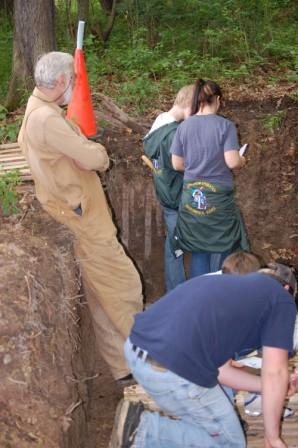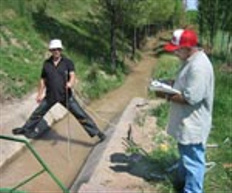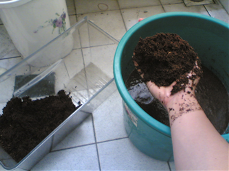Soil Testing/Analysis
Why?
If you are wondering why your garden crops haven’t been quite up to par or are just wanting to get this year’s garden off to a good start, then a great place to begin is with a reliable soil test.
Reasons to test your soil:
- Develop a healthy and nutritionally balanced soil
- Avoid the costly overuse of fertilizers
- Learn valuable garden management information, including tips on tillage and the use of organic matter
- Contribute to a healthy environment
- Grow stronger, healthier plants, and increase crop yields
Our unique program goes a step further than most – it takes into consideration the whole-plant environment by testing soil elements plus closely examining cultivation practices.
Soil testing takes the guesswork out of gardening and mini farming, and it saves money, time, and effort. Healthy soils produce healthy plants and healthy plants are more resistant to insect damage and disease.

Al Shawab Agriculture's engineers has been helping mini farmers and home gardeners grow high-quality, nutritionally rich produce for over 2 years.
Soil Testing
The unique Al Shawab Agriculture's Soil Testing program considers the whole-plant environment by testing soil elements and closely examining cultivation practices. This enables us to help our clients obtain maximum soil fertility, regardless of the soil type or geographic location.
 Our
basic program includes analysis of 18 different areas of your soil,
including cultivation practices. We go a step beyond many other soil
testing companies by addressing other factors affecting your plant
growth such as organic matter, soil oxygen, and soil moisture.
Our
basic program includes analysis of 18 different areas of your soil,
including cultivation practices. We go a step beyond many other soil
testing companies by addressing other factors affecting your plant
growth such as organic matter, soil oxygen, and soil moisture.
Our trace mineral testing includes most of the essential micronutrients (trace minerals) affecting plant growth. It is not uncommon for most soils to be deficient in one or more of those micronutrients, such as boron, iron, or zinc. Trace mineral deficiencies can restrict the availability to plants of certain major nutrients, even when a sufficient supply of those nutrients is present in the soil. A trace mineral test is recommended annually for commercial growers, and every three to five years for home growers.
 Each
of our clients receives a comprehensive Soil Test Summary Report, with
individual nitrogen and phosphorous recommendations tailored to the
crops and plants identified on the Soil Sample Information Form.
Each
of our clients receives a comprehensive Soil Test Summary Report, with
individual nitrogen and phosphorous recommendations tailored to the
crops and plants identified on the Soil Sample Information Form.
 Additional
testing is also available for individual needs. Our List of Services
provides more details on these optional tests.
Additional
testing is also available for individual needs. Our List of Services
provides more details on these optional tests.
One of our more popular optional services is plant tissue analysis. When used in combination with soil testing, it is an excellent way to develop an overall soil management program while also monitoring plant health. Soil testing measures the nutrient status of the soil, and plant tissue analysis reveals how well crops are recovering these nutrients from the soil.
 Plant
tissue analysis verifies “hidden hunger” and visual deficiency
symptoms and pinpoints which nutrients plants need. We recommend soil
testing prior to plant tissue analysis. However, plant tissue
analysis, if done early, will allow a corrective fertilizer application
in the same season. It can also be done any time a specific
plant-growth problem is supected.
Plant
tissue analysis verifies “hidden hunger” and visual deficiency
symptoms and pinpoints which nutrients plants need. We recommend soil
testing prior to plant tissue analysis. However, plant tissue
analysis, if done early, will allow a corrective fertilizer application
in the same season. It can also be done any time a specific
plant-growth problem is supected.
We often hear success stories from our clients about significantly increased yields of quality produce. Many are home gardeners and small farmers and they’re scattered all over the country. Regardless of their geographic location, they have one thing in common – results.



Why Test?
The nutrient status of a given soil can vary significantly from year to year. Factors such as the addition of fertilizers, reductions or increases in organic matter, harvesting crops, tillage, watering practices, and rainfall can all alter the balance of nutrients in your soil. Unbalanced soil can affect future yields and possibly the health of crops.
 A
soil test is a valuable tool for monitoring and maintaining optimal
soil fertility. When soil testing is combined with sound tillage and
organic matter management practices, the chances for healthy and
productive crops are optimized. The unique Timberleaf Soil Testing
Program goes a step further than most – it takes into consideration the
whole-plant environment by testing soil elements plus closely examining cultivation practices.
A
soil test is a valuable tool for monitoring and maintaining optimal
soil fertility. When soil testing is combined with sound tillage and
organic matter management practices, the chances for healthy and
productive crops are optimized. The unique Timberleaf Soil Testing
Program goes a step further than most – it takes into consideration the
whole-plant environment by testing soil elements plus closely examining cultivation practices.
In every test, we take into consideration the soil differences that can occur locally as well as regionally due to variations in the native mineral content. It is not unusual for us to determine that amendments suitable for one geographical area are completely inappropriate for nearby neighbors or farms.
The soil needs of certain plants can vary considerably. Blueberries, for example, require a more acidic soil than most vegetable crops. A soil test can save you time and money by giving you the information you need to determine which plants are most acclimated to your particular soil condition.
We have found over the years that overuse of fertilizers is a major cause of unbalanced soil conditions. It takes much longer to balance a soil containing excess quantities of mineral nutrients than one deficient in them. With a soil test, you take the guesswork out of fertilizing thus saving time, labor, and unnecessary costs, while helping to preserve the environment.
A soil test is also a valuable information tool for potential new home or property buyers. By knowing the “fertility status” of the land you intend to buy, you will know prior to purchase the pluses and minuses for growing successfully on that property.